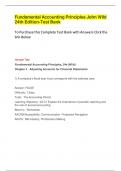Exam (elaborations)
Fundamental_Accounting_Principles_John_Wild_24th_Edition_Test_Bank Grade A+
- Course
- Institution
- Book
Sample Test Fundamental Accounting Principles, 24e (Wild) Chapter 3 Adjusting Accounts for Financial Statements 1) A company’s fiscal year must correspond with the calendar year. Answer: FALSE Difficulty: 1 Easy Topic: The Accounting Period Learning Objective: 03-C1 Explain the importan...
[Show more]



